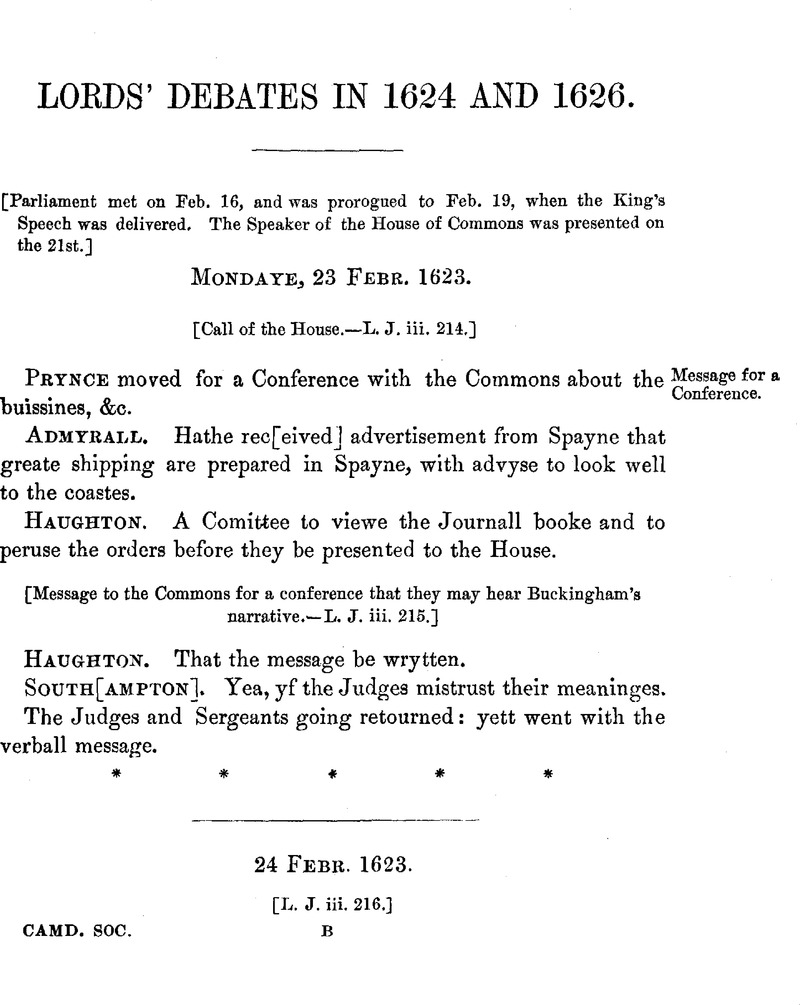No CrossRef data available.
Article contents
Lords' Debates in 1624
Published online by Cambridge University Press: 24 December 2009
Abstract

- Type
- Lords' Debates in 1624 and 1626
- Information
- Copyright
- Copyright © Royal Historical Society 1879
References
page 2 note a i.e. Denies that he ought.
page 3 note a M.S. “the satesfye the the,” with a penstroke through all.
page 3 note b i.e. are agreed that.
page 4 note a “In his last” are inserted in the MS. underneath the word “something,” and may be meant to come in where I have put them, as they do not seem to fit anywhere else.
page 7 note a Western, Chancellor of the Exchequer.
page 7 note b ? The Prince's.
page 7 note c Ciriza.
page 8 note a Blank in MS.
page 8 note b Sic.
page 12 note a “a proposicion” was originally written. The “a” has been changed to “an,” but the writer forgot to draw his pen through “proposicion.”
page 14 note a The words “gyve an accompt” are an interlineation. The words “satisfye us” are left unerased, a line being drawn under them instead of through them.
page 15 note a Sir R. Cotton, who acted as messenger between Somerset and the Spanish Ambassador.
page 15 note b Sir R. Weston, Chancellor of the Exchequer, sent to Brussels in 1622.
page 15 note c Lord Chichester of Belfast, sent to Germany in 1622.
page 17 note a Meaning, I suppose, that the former treaty for Prince Henry's marriage, which had been opened by the Spanish Ambassador, came to nothing. When it was pressed by Digby in 1611 it was broken off, and the Ambassador disavowed, on the ground that the marriage could not take place unless the Prince were converted. But, if they were so resolute then, how could they be less resolute at a later time ?
page 20 note a The care of the rest.
page 24 note a The sum should be 661,611.
page 26 note a Meaning, I suppose, if we meddle with it, we know by experience that we shall do hurt.
page 29 note a The general answer does not go sufficiently into details, or say exactly what they will do.
page 31 note a i.e. declaration.
page 32 note a The word Prince is written over “not,” showing that he voted alone against the motion.
page 35 note a This perhaps stands for “received.”
page 36 note a The Bishop of Bristol.
page 36 note b Probably “delayed.”
page 41 note a Perhaps this should be “might say.”
page 43 note a Perhaps this should be “false information to us,” namely that his grivance had been listened to by the Commons.
page 45 note a “The words from” vizt.“to” examine him are underlined. It is possible that the writer may haye intended to draw the line through them.
page 47 note a “Honorable” [?].
page 48 note a Apparently the names of those who voted “not content.”
page 49 note a “Comons” in MS.
page 50 note a For a conference on the use to be made of the subsidies.
page 52 note a i.e. for which it is now too late.
page 60 note a The Lord Treasurer. See p. 57.
page 61 note a This seems to be a continuation of the speech of Middlesex.
page 63 note a The Bishop of Durham.
page 63 note b Zay MS.
page 69 note a i.e. It was a loss to the farmers.
page 74 note a Blank in MS.
page 77 note a i.e. Wardróbe. Middlesex having held both offices, the mistake was easy.
page 80 note a “Too” MS.
page 87 note a i.e. two-thirds.
page 88 note a i.e. Fine him, but do not confiscate his goods, as you would if you cancelled the lease of the sugar duties.
page 94 note a i.e. the Bishops
page 105 note a Sabathi MS.


